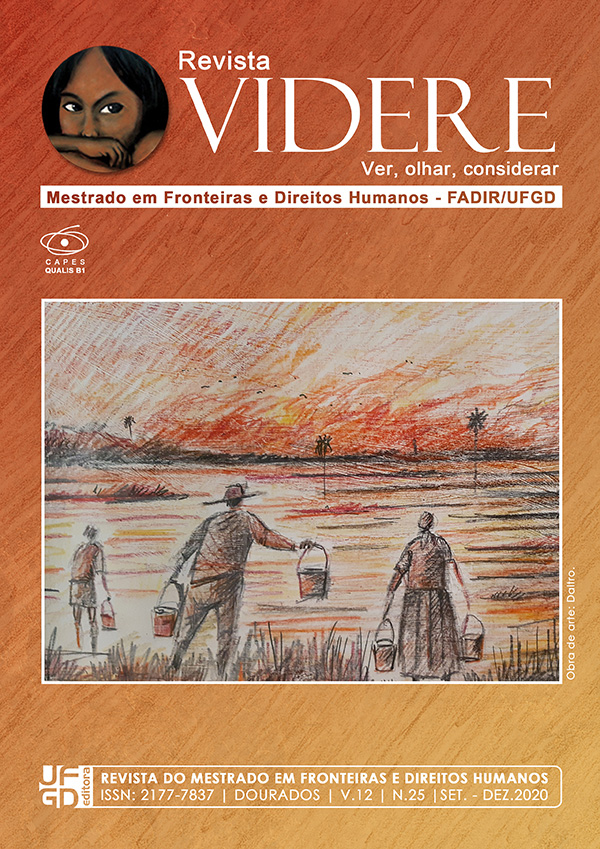The UN Committee Teitiota v New Zeland's decision and the human rights' protection in the context of natural events: from the theory of positive obligations to the prohibition of refoulement
DOI:
https://doi.org/10.30612/videre.v12i25.12618Keywords:
Climate change. Forced migration. Positive obligations to protect. Principle of nonrefoulement. Cartagena declaration on refugees.Abstract
In its Teitiota v. New Zeland’s landmark decision, The UN Human Rights Committee set out two fundamental principles of international law. It recognizes that the effects of climate change and natural disasters may give rise to violations of the right to life and the prohibition of inhuman or degrading treatment, and thus trigger the non-refoulment obligations of sending states. The purpose of this paper is to consider how The UN Human Rights Committee Teitiota’s decision may facilitate the protection of environmentally displaced persons under the 1984 Cartagena declaration.Downloads
References
CANTOR, D., Leyes, Polìticas y pràcticas en materia de protecciòn temporale humanitaria de extranjeros en el contexto de desastres, San José, Costa Rica, Nansen Initiative, 10-11 de febrero 2015.
CONFERENCIA INTERNACIONAL SOBRE REFUGIADOS CENTROAMERICANOS, Principios y criterios para la proteccion y asistencia a los refugiados, repatriados y desplazados centroamericanos en america latina, Ciudad de Guatemala, CIREFCA 89/9 Abril 1989.
HUMAN RIGHTS COMMITTEE, General comment No. 36 (2018) on article 6 of the International Covenant on Civil and Political Rights, on the right to life, CCPR/C/GC/36, 2018.
INTERNAL MONITORING CENTER, Global Report on Internal Displacement 2020 https://www.internal-displacement.org/, asseso em 22 jul 2020.
PLAN DE ACCIÓN DE BRASIL, Una hoja de ruta común para fortalecer la protección y promover soluciones sostenibles para las personas refugiadas, desplazadas y apátridas en América Latina y el Caribe dentro de un Marco de cooperación y Solidaridad, Brasilia, 3 de diciembre de 2014.
SCOTT, M., Climate Change, disasters, and the Refugee Convention, Cambridge, Cambridge University Press, 2020.
SCOTT, M., Finding Agency in Adversity: Applying the Refugee Convention in the Context of Disasters and Climate Change, Refugee Survey Quarterly, v. 35, n. 4, p. 26–57, 2016.
UN HIGH COMMISSIONER FOR REFUGEES, Reunión de expertos Interpretación de la definición ampliada de refugiado contenida en la Declaración de Cartagena sobre Refugiados de 1984, Montevideo,15 y 16 de octubre de 2013. Antropocene, Lessico del XXI Secolo, Treccani, 2012.
UN HIGH COMMISSIONER FOR REFUGEES, Persons covered by the Oua Convention Governing the Specific Aspects of Refugees Problems in Africa and by the Cartagena Declaration on Refugees (Submitted by the African Group and the Latin American Group), EC/1992/SC, 1–17, 6 April 1992.
UN HIGH COMMISSIONER FOR REFUGEES, Climate change, disaster and displacement in the Global Compacts: UNHCR's perspectives, 2017.
UNITED NATIONS GENERAL ASSEMBLY, Providing legal protection for persons displaced by the impact of climate change, A/73/L.105, 2019.
UNITED NATIONS, Report of the United nations High Commissioner for Refugees: Global Compact on Refugees, A/73/12 (Part II), 2018.
Giurisprudenza
AFRICAN COURT ON HUMAN AND PEOPLES' RIGHTS, Communication 155/96 Social and Economic Rights Action Center (SERAC) and Center for Economic and Social Rights (CESR) / Nigeria, 27 October 2001.
CORTE EUROPEA DEI DIRITTI DELL’UOMO M. Özel and others v. Turkey ,17 November 2015, 14350/05, 15245/05 and 16051/05.
CORTE EUROPEA DEI DIRITTI DELL’UOMO, MSS c. Belgio e Grecia, 21 gennaio 2011 [GC], 30696/09.
CORTE EUROPEA DEI DIRITTI DELL’UOMO Budayeva and others v. Russia, 20 March 2008, 15339/02, 21166/02, 20058/02, 11673/02 and 15343/02.
CORTE EUROPEA DEI DIRITTI DELL’UOMO, Öneryildiz v. Turkey, 30 November 2004 [GC], 48939/99.
INTER-AMERICAN COURT OF HUMAN RIGHTS Portillo Cáceres et al. v. Paraguay (CCPR/C/126/D/2751/2016).
UN HUMAN RIGHTS COMMITTEE, Ioane Teitiota v. New Zealand (advance unedited version), 7 January 2020, CCPR/C/127/D/2728/2016.
INTER-AMERICAN COURT OF HUMAN RIGHTS, Advisory opinion OC-23/17 of 15 November 2017 on the environment and human rights, series A, No. 23.
Downloads
Published
How to Cite
Issue
Section
License
Authors must accept the publication rules when submitting the journal, as well as agree to the following terms:
(a) The Editorial Board reserves the right to make changes to the Portuguese language in the originals to maintain the cultured standard of the language, while respecting the style of the authors.
(b) Authors retain the copyright and grant the journal the right to first publication, with the work simultaneously licensed under the Attribution-NonCommercial-ShareAlike 3.0 Brazil (CC BY-NC-SA 3.0 BR) that allows: Share - copy and redistribute the material in any medium or format and Adapt - remix, transform, and create from the material. CC BY-NC-SA 3.0 BR considers the following terms:
- Attribution - You must give the appropriate credit, provide a link to the license and indicate whether changes have been made. You must do so under any reasonable circumstances, but in no way that would suggest that the licensor supports you or your use.
- NonCommercial - You may not use the material for commercial purposes.
- Sharing - If you remix, transform, or create from material, you must distribute your contributions under the same license as the original.
- No additional restrictions - You may not apply legal terms or technological measures that legally restrict others from doing anything that the license permits.
(c) After publication, authors are allowed and encouraged to publish and distribute their work online - in institutional repositories, personal page, social network or other scientific dissemination sites, as long as the publication is not for commercial purposes.



















